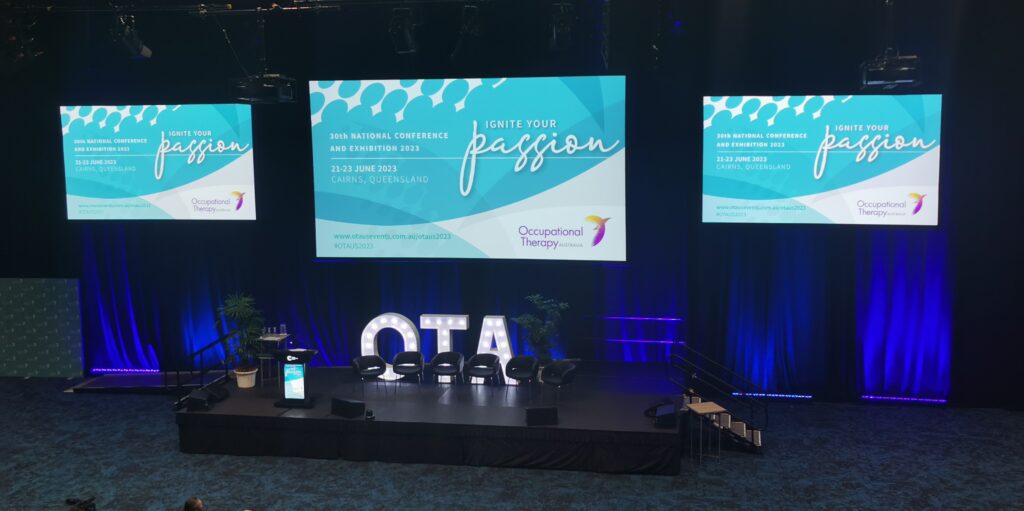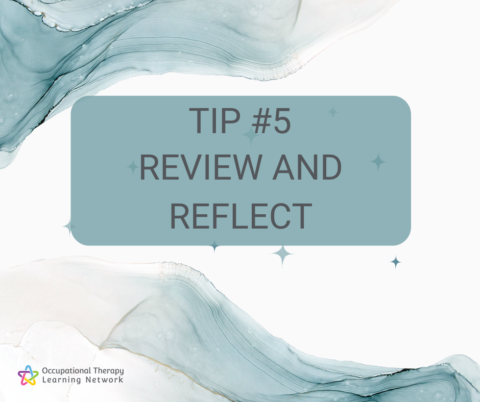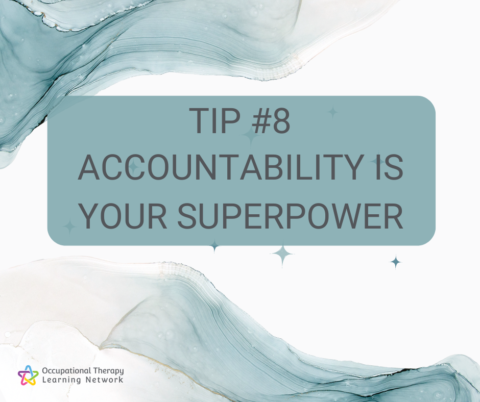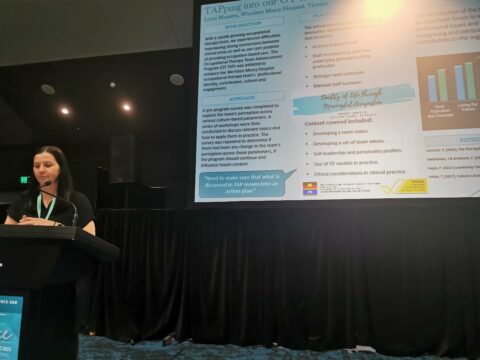Ten tips to advance your professional development from attending Occupational Therapy conferences.
Engaging in occupational therapy conferences presents a powerful opportunity for professional development and growth. Conferences bring together academics and clinicians from various clinical areas, offering a wealth of knowledge, innovative practices, and networking possibilities. However, to truly make the most of these conferences and minimise the risk of feeling overwhelmed, it’s critical to have a strategic approach that allows you to extract valuable insights and establish meaningful connections.
Let’s explore ten essential tips that will empower you to unlock the learning potential and maximise the benefits of attending occupational therapy conferences. With these tips, you can navigate conferences with intention, prepare effectively, leverage networking opportunities, and reflect on your experience for ongoing growth.
1. Get clear on your why.
Take the time to understand your personal and professional goals for attending the conference as this will guide you during the experience.
- Are you looking to expand your knowledge in a specific area of occupational therapy?
- Do you want to learn about the latest research and evidence-based practices?
- Is there a particular presenter that you would like to connect with?
Clarify the specific knowledge, skills, or connections you hope to gain from the event. This could include connecting with clinical experts, networking with like-minded peers, or discovering new evidence-based knowledge to implement in your practice. Having a clear purpose will help you focus your time and energy during the busyness of a conference.
2. Block out time for follow-up.
Blocking out time for attending the conference is only one aspect to make the most of your experience. Allocating dedicated time in your schedule after the conference to reflect on key takeaways, nurture new contacts, and address action items is also just as important. By setting aside time for follow-up, this demonstrates your commitment to leveraging the conference experience for meaningful development, thereby maximising the return on your investment of time and resources. Failing to follow up on valuable insights, connections, or potential collaborations may result in lost chances to enhance your practice and expand your network.

3. Show up prepared.
Showing up at a conference feeling prepared is key to making the most of the experience. Take the time to research the conference program, speakers, and topics in advance. Familiarise yourself with the sessions and workshops that align with your professional interests and goals. Come prepared with thoughtful questions to ask presenters or fellow attendees, allowing you to engage in meaningful discussions. Additionally, identify specific areas of interest that you want to explore further during the conference. This proactive approach supports your commitment to active engagement and maximises the learning opportunities.
4. Create a LinkedIn profile.
Creating a LinkedIn profile allows you to easily establish a professional online presence. You can showcase your expertise, achievements, and interests to colleagues and potential employers. The LinkedIn platform allows you to connect with fellow conference attendees and presenters and continue any conversations long after the conference ends. These connections can help you stay updated on the latest trends, research, and could lead to collaborations on future projects. By leveraging LinkedIn’s networking capabilities, you can enhance your professional visibility, foster connections, and open doors to new possibilities in your career.
5. Review and reflect.
Reviewing and reflecting on your conference experience is essential for maximising its impact on your professional development. Take the time to revisit conference materials, including presentation slides, handouts, and recorded sessions. By doing so, you can refresh your memory, identify key insights, or research findings that resonate with your practice. You can start to consider how you might want to integrate them into your work. Reflection enables you to critically evaluate the information gained and consider how it aligns with your current practices or challenges existing beliefs. It also provides an opportunity to identify areas for growth and improvement in your professional journey. By actively reviewing and reflecting on your conference experience, it will increase the likelihood of the new knowledge gained being translated into meaningful changes in your occupational therapy practice.

6. Share your insights.
I encourage conference attendees to share their insights and conference experiences with their colleagues. This might be via various platforms such as presentations, blog posts, or social media. Engaging in knowledge sharing not only contributes to your own professional growth but also fosters collaboration within the occupational therapy community. By sharing your experiences, you offer a unique perspective and can spark discussions that lead to new ideas. Sharing insights allows you to extend the reach of the conference beyond its physical and virtual boundaries, reaching a wider audience and inspiring fellow occupational therapists. Additionally, it opens doors for networking opportunities and the exchange of valuable information. Remember, by actively participating in knowledge sharing, you play a role in enhancing the collective expertise of the occupational therapy profession and contribute to its continuous development.
7. Goals help maintain focus.
Setting goals for the conference is a powerful way to maintain focus and make the most of your time and energy. Be specific and identify what you hope to achieve from the event, whether it’s attending specific sessions or networking with specific individuals. These goals provide a clear direction, guide your decision-making and help you prioritise your efforts. Goals also provide motivation and a sense of purpose, keeping you engaged and driven throughout the event. So, take a moment to set clear and actionable goals before the conference begins, and let them serve you as a tool in maintaining your focus and ensuring the best use of your energy.
8. Accountability is your superpower.
Accountability is a superpower when it comes to maximising the benefits of attending a conference. Find an accountability partner that you can regularly check-in with to share experiences and provide support in achieving your conference-related goals. This could be someone who is also attending in person or virtually. This accountability not only keeps you motivated and focused, but it also provides an opportunity for reflection and learning from each other’s experiences. Your accountability partner can offer new insights, offer encouragement, and help you stay on track. By embracing accountability, you unlock the potential for improved follow-through, and commitment to your professional growth. So, don’t underestimate the power of accountability—it can be a game-changer in making the most of your conference experience.

9. Keep all your notes in one place.
Keeping all your conference notes in a systematic way offers numerous benefits for your professional development. Whether you opt for a digital or physical system, organising and storing your conference notes, handouts, and business cards in one place is essential. This systematic approach simplifies the process of reviewing and referencing valuable information in the future. You can easily revisit key insights, research findings, or contact details, saving you time and effort in searching for scattered notes. It also facilitates better integration of new knowledge into your practice, ensuring that you can readily apply what you have learned from the conference. By keeping your notes in a systematic way, you create a valuable resource that supports continuous learning and professional growth.
10. Were my expectations met?
Reviewing your expectations about attending the conference and reflecting on whether they were met is the final piece in the conference participation experience. Take the time to evaluate the conference experience against your initial goals and expectations. Reflect on the knowledge you gained, the connections you made, and the overall impact the conference had on your professional development.
- Did you acquire new insights and skills that align with your objectives?
- Did you establish meaningful connections and expand your professional network?
Assessing the conference’s outcomes allows you to gauge its effectiveness and determine if it fulfilled your expectations. This reflective process provides valuable insights into the value of the conference and helps you make informed decisions about future attendance or adjustments to your professional development plans.

Attending occupational therapy conferences offers tremendous opportunities for professional growth and development. By implementing these ten tips, you can unlock the learning potential and maximise the benefits. Approach each conference with intention, preparation, and a commitment to ongoing learning and networking. Get clear on your goals and protect the time it deserves so you can seize the opportunity to expand your knowledge, connect with peers and enhance your occupational therapy practice.
If you want to share your tips on maximising the learning potential of attending conferences, come and join the Facebook group, OTs who love learning HERE or if you need the accountability to apply your new knowledge from attending the conference, the OT Learning Network might be what you are looking for.
